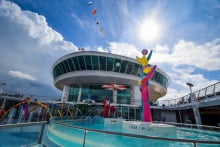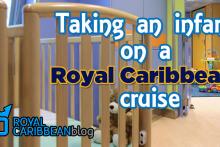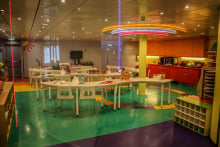If you’re a cruiser with kids, the day will come when you will face the question that has been the cause of many parent arguments: should you take the kids out of school in order to go on a cruise?
Before it leads to one parent sleeping on the couch after an epic fight over it, let’s take a closer look at the issues surrounding taking a child out of school.
While we’re specifically talking about cruising, most of these ideas apply to any vacation.
We all know that cruises are wonderful opportunities for kids.
They learn wonderful dinner etiquette. You can tell a cruiser’s child because they actually know what that extra fork is for.
They learn to interact with strangers and how to hold conversations. Only cruisers know how quickly you can make friends while waiting in line at the buffet.
If they participate in the children’s program (like RC’s Adventure Ocean), they get practice in quickly making friendships and following the directions of new adults in charge. You’re in a blue shirt? I’ll do whatever you say!
Everyone understands that visiting a place is the best way to gain an appreciation of it, and cruising allows kids the opportunity to see many places they would otherwise never have had the opportunity to visit.
Gaining an appreciation of how much we have is easy when you visit places where people live a very different life from that of the child.
The list goes on and on. Cruises are wonderful opportunities for learning and creating curiosity, the driver of all learning.
While there are many benefits of cruising, those benefits must be weighed against the difficulties involved in missing school.
It’s important to consider what missing school will mean for the family. For starters, the child will likely be tired, and yet there will be double the work to do. There’s nothing like a whining, exhausted kid to ratchet up that post-cruise depression.
Additionally, no benefits of cruising are available only when the child is missing school. Those benefits are available during school vacation time as well.
So, how are parents to decide what is right for their families?
Deciding to Go on Vacation During the School Year: Consider the ROI

Time is an investment in the same way money is. When considering whether to invest time in a cruise when a child would normally be in school, families need to weigh the costs and return on that time investment.
For some families, a special occasion is occurring. Perhaps the grandparents are celebrating a special anniversary or there is another family milestone, such as a destination wedding or even the scattering of ashes. Clearly, these cannot be put off until the next vacation. They are date-specific.
You’ll have to decide for yourself if a really good sale counts as a special occasion!
For some families, such as those with a parent in the military, the parent’s leave does not coincide with school vacations, and if the family is to be able to travel together, the child must miss school. This can happen with other occupations as well, so if you or your spouse have jobs where you can’t take vacation at more convenient times, the decision may be out of your hands.
Depending upon the child, you may want to bring him in on the decision. While parents sometimes assume that every child wants to go on a cruise, every now and then that won’t be the case.
Other Factors to Consider
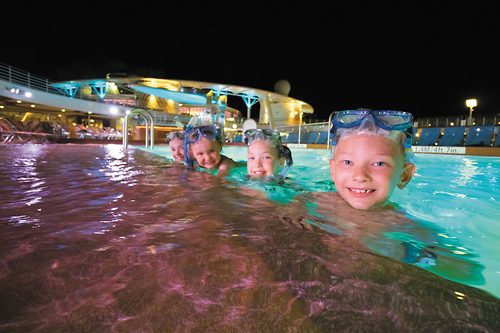
The school’s policy on absences should factor into your decision. If they have a strict limit on the number of absences, a cruise may mean that your child has no wiggle room the rest of the year.
For some high school students, a single unexcused absence can mean the loss of final exam exemptions (which is, according to most high school students, a fate worse than death).
Consider the time you’re leaving. Some instructional time is more valuable than other times. For example, you won’t want to be gone the week before state testing, when big projects are due, or right after holidays (which tend to be busy instructional times).
Good times to miss include a day or two before a scheduled vacation. For example, if your school district is open the Monday and Tuesday before Thanksgiving, any teacher will tell you that those days are not the most efficient learning days!
Children are different, and while one child may thrive missing a few days of school here and there, others will find the entire experience stressful. This is common in kids who are super conscientious, who have very strong relationships at school, or who need a strict schedule to function best.
While cruise fares may be lower during vacation times, when you are gone the school is losing money. Most schools receive payment based on the daily attendance. They still have to keep the lights on and the AC humming, even if your child isn’t there. This isn’t a reason not to go, but it’s something to keep in mind.
While you won’t be able to predict this, it’s possible that you will have another emergency come up, and you may regret burning up the teacher’s good will on a vacation when the child ends up missing another week of school due to another unforeseen circumstance.
Clearly, missing school becomes a bigger issue as the children get older. Missing a couple of days of Kindergarten is not as consequential as missing two days of calculus. Some high schools are on block schedules, where missing two days is like missing a week.
Things to Do Before You Go

Let’s say you’ve made the thoughtful decision to YOLO book it, and you’ve got your friendly neighborhood travel agent working on an epic cruise vacation for the fam. What steps should you take once the decision has been made?
The person to talk to right after the travel agent is the teacher. Let the teacher know you’re going and how long you’ll be gone. If you’ve got a special reason for going, let the teacher in on it.
It definitely sounds better to tell the teacher that Grandma and Grandpa are celebrating their fortieth anniversary than that there was a Kids Sail Free deal you couldn’t pass up. If that’s the story, it’s best left unsaid. That can be our secret.
Don’t be surprised if in today’s digital world, the school may expect the child’s virtual participation, even if the child’s not physically in school. Just think of it as a great excuse to buy that souped up internet package.
Things to Ask Before You Go
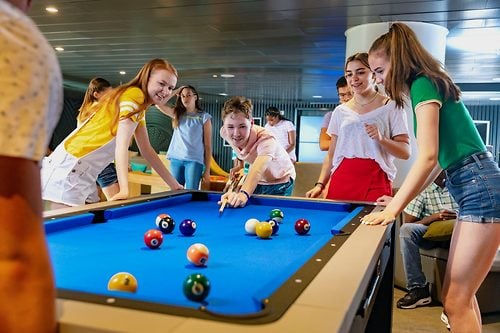
Leaving for a cruise is the perfect time to do some pre-trip planning. In addition to making sure you’ve done your pre-cruise shopping, ask the teacher a few key questions.
Here are some ideas of questions you may wish to ask your child’s teacher:
Is there anything that my child can begin before we leave?
If you don’t have the assignments ready before we leave, can you please share what topics you’ll be covering? (This will allow your child to watch videos on cell division instead of cute puppies – unless you can find a video of cute puppies talking about cell division. If your child is currently on Chapter 7 in the math textbook, you can safely assume they’re moving through the textbook in order. This is not true of all classes, though, so check!)
Do you have any preferred tutorial video sites for when my child is working independently? (Some teachers may have a preference, such as Khan Academy or the textbook’s website.)
When will the make-up work be due? (You’ll need this information to plan.)
Are there any assignments my child will miss that can’t easily be made up that we can offer something else in lieu of it? (For example, a child can’t do group work with other students, but may be able to create a slideshow about how the crew cleans a ship.)
Asking these questions helps your child have a better experience returning to school, and they also send a signal to the teacher that you are proactive and on top of it. That makes it more likely the student will have a smooth re-entry to class.
Avoid Making Assumptions about the Work You’re Given
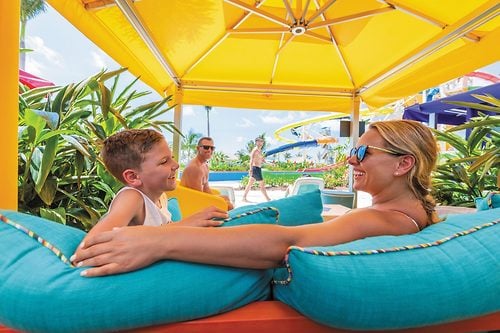
Sometimes, parents get very little actual work to be made up and think, “Wow, they didn’t miss hardly anything! We should take little Tabitha out of school more often!”
In today’s classroom, less and less of the work of school can be sent home. More and more of it is collaborative learning that isn’t easily reproduceable. What you’re getting is just what could be distilled to a piece of paper or specific, solo assignment.
Today’s classroom is about learning even more than work in the form of paper and pencil assignments. It’s about groups being formed, group activities where a missing person causes issues for the entire group, and about creating a strong classroom community where questioning leads to deep thinking.
If you get five pages of work for three days out of class, you can assume that the child missed a number of these kinds of learning experiences.
That’s not a deal-breaker, but it’s something to keep in mind.
What to do During the Cruise
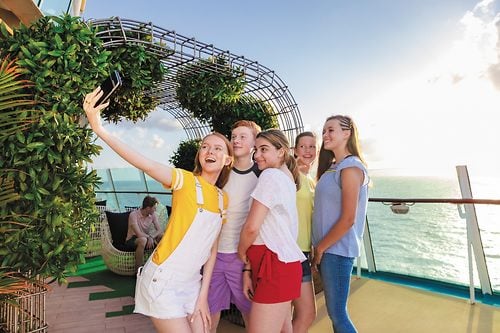
When you have a child returning to school immediately after the cruise, it’s important to try to return to a semi-normal schedule before the end of the cruise. You may want to switch away from that 8:30pm dining time the last night or two if that’s normally the child’s bedtime at home!
Use slow times on the cruise to keep learning fresh. You’ll know what learning your child is doing because of those handy conversations you had with the teacher before the cruise, and now those conversations will pay off.
When you look for them, it’s surprising how many there are. Take advantage of times riding in taxis or on ferries or on long bus rides for excursions.
You’re going to be standing in lines for everything from water slides to dinner to evening shows. Use those times to have casual (but surprisingly helpful) conversations about what your child is learning.
You can also look for easy ways for your child to apply his or her learning. For example, if the child is learning how to calculate the area of two-dimensional shapes, measure things on the ship.
If the child is old enough, getting them a special cruise journal to write about what they’re experiencing is a perfect way to blend learning skills with creating memories that will last a lifetime.
If the child is too young to write themselves, it’s a fun family activity to have them dictate to you what the highlights of their day were.
One last tip: lots of kids find it fun and very interesting to ask the crew members they meet about their own educations. They will learn so many different ways of schooling, and it’s quite a revelation the first time they hear that other kids have to leave home to attend school, wear uniforms every day, or that parents had to sacrifice a lot for the child to be able to attend school.
What to do After a Cruise
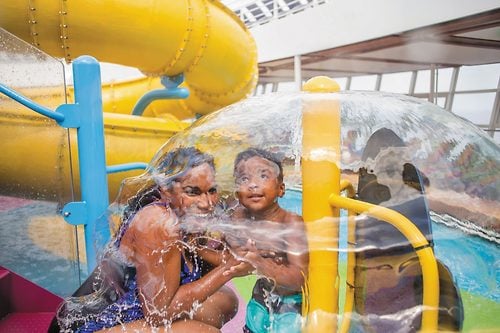
It’s hard to remember in the midst of our own post-cruise letdown that we have to help our child smoothly return back to school.
To make that transition as seamless as possible, here are a few tips.
Have the child return with as much of the pre-supplied work completed as possible.
Send the work with a thank-you note for the teacher, along with a small gift (like a $5 Starbucks gift card) to acknowledge the extra work the teacher went to making that vacation possible. Don’t give them a keychain from your super wonderful all-inclusive resort beach day! That’s just mean!
Plan out the remaining make-up work, and have the child turn in assignments as they are completed, rather than a big packet all at once.
Sleep is key to making all of this as painless as possible, so get the child back in the sleep groove as soon as possible.
After all of the make-up work is completed, have a reflective conversation with the child. Was the extra work worth it? Would the child want to do the same or similar thing again? Sometimes we assume kids want nothing more than to skip school, but that’s not always true.
If there are loads of complaining from the child following the cruise, consider how to handle that in the future. Now you know what will likely happen, and you can prepare even more effectively.
Siblings can be very different from each other, so families with a number of children may have to navigate competing needs. This is especially true if the siblings are several years apart because it’s much more difficult to miss school the older the child gets.
Considering these things is part of the post-cruise process that will set you up for success in the future.
Wrapping Up/Conclusion
In today’s complicated world, family schedules may not align with school schedules, but family goals can align with school goals.
Families and teachers can work as partners to make sure children have both the family experiences and educational experiences they need.
If you’ve considered taking your child out of school for a cruise or vacation, these tips should help make that process as painless as possible.
Lisa Van Gemert, M.Ed.T., is an nationally-known educator and author who loves both cruising and school. If you run into her at sea, she'll probably ask your child what they're learning in school or reading. You can get other tips and information for both parents and teachers at her website, GiftedGuru.com.



